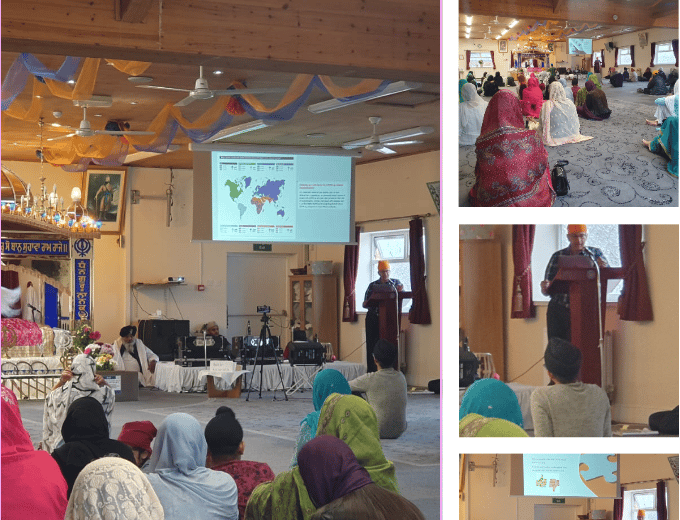Diabetes - Epidemic in the Asian Community
Asian Indians have a high rate of diabetes. SGSSG Kettering was visited by a local doctor to explain how to prevent the onset of such a dangerous disease,


What is Diabetes?
Diabetes is a long-lasting health condition that affects how your body turns food into energy.
Your body breaks down most of the food you eat into sugar (glucose) and releases it into your bloodstream. When your blood sugar goes up, it signals your pancreas to release insulin. Insulin acts like a key to let the blood sugar into your body’s cells for use as energy.
There isn’t a cure yet for diabetes, but losing weight, eating healthy food, and being active can really help.
Why are there two different types of Diabetes?
There are 2 main types of diabetes:
type 1 - a lifelong condition where the body's immune system attacks and destroys the cells that produce insulin
type 2 – where the body does not produce enough insulin, or the body's cells do not react to insulin properly
Type 2 diabetes is far more common than type 1. In the UK, over 90% of all adults with diabetes have type 2.
The main causes of Diabetes in the Asian Community
The vast majority of scientists agree that the increase in type 2 diabetes is linked to profound changes in the Indian consumption diets. There is also other risk factor such as lack of physical exercise, obesity, stress, and so on. Whilst the traditional Indian diet was mainly based on whole grains and vegetables, the modern world has encouraged the consumption of processed food and refined grains which are high in calories. This is then accelerated by smoking and high consumption of alcohol.
What are the symptoms of diabetes and when should i see a GP?
Visit your GP as soon as possible if you experience the main symptoms of diabetes, which include:
feeling very thirsty
peeing more frequently than usual, particularly at night
feeling very tired
weight loss and loss of muscle bulk
blurred vision
Weight loss is common in people with type 1 diabetes when it first develops and before it's treated, but it's less common in people with type 2 diabetes.
Many people have type 2 diabetes for years without realizing it because the early symptoms tend to be general, or there are no symptoms at all.
Diabetic Eye Screening
Everyone with diabetes aged 12 years old or over should be invited to have their eyes screened regularly.
If you have diabetes, your eyes are at risk from diabetic retinopathy, a condition that can lead to sight loss if it's not treated.
Screening, which includes a 30-minute check to examine the back of the eyes, is a way of diagnosing diabetic retinopathy and detecting the condition early where possible so it can be treated more effectively. In many people, this can stop it affecting their vision or reduce the chance of it getting worse.
It's important to see a doctor if you notice any problems with your eyesight. Do not wait for your next screening appointment.
Living with Diabetes
If you are diagnosed with Diabetes you will need to start to eat healthy, do regular exercise, and have regular blood tests.
If you have type 1 diabetes you will require insulin injections for the rest of your life.
Type 2 diabetes will get worse over time if you continue to eat unhealthily and do not exercise. You will also need to take tablets and have injections.
There is some good news, however! Many people with type 2 diabetes can reverse it by losing weight, doing regular exercise, and choosing a low-calorie diet. It is however important to get medical advice first from your GP.
Should I tell my friends or family about my diabetes?
Most definitely. When your friends know that you have diabetes, they can understand the decisions you have to make. For example, ordering something healthier when you are out in a restaurant or if you are not feeling up to doing something one day if you are tired. If you decide to share, you may find that it makes your friendship and family bonds even stronger.
